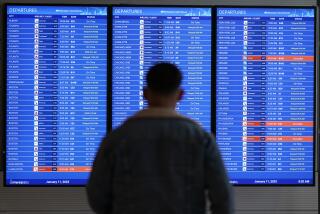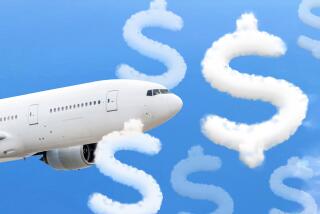Airline trade group expects to chop loss in half in 2010
The airline industry will rebound modestly next year, losing only about half of what it is expects to lose in 2009, a trade group predicted Tuesday.
“The worst is likely behind us,” said Giovanni Bisignani, director general of the International Air Transport Assn., the trade group that issued the financial outlook. The association represents about 230 airlines worldwide.
The group’s forecast for $5.6 billion in net losses next year attributes the improving picture partly to growing passenger and cargo demand.
Still, other airline experts say the industry is not in the clear yet. Many unpredictable factors -- including fuel prices -- could lead to more losses next year.
“There is too much volatility in the marketplace to make a forecast,” said David Castelveter, a spokesman for the Air Transport Assn. of America, which represents the largest air carriers in the U.S.
The recession has hit airlines hard by drying up business travel budgets, a key revenue stream. Most carriers responded by cutting capacity -- eliminating flights and parking aircraft -- and adopting new passenger fees to check bags, board early and upgrade seats, among other services.
The forecast predicted that net losses next year would be about 15% higher than the $3.8 billion the group had previously forecast. Still, the losses are just a little more than half the $11 billion that association anticipates losing in 2009.
Revenues for the world’s airlines are expected to rise to $478 billion in 2010, an increase of $22 billion from 2009, according to the forecast. Still, that figure is about 11% below the peak of $535 billion in 2008.
After a 4.1% drop in passenger traffic in 2009, the international group predicts traffic to grow 4.5% next year, with a total of 2.28 billion people flying. Airlines will also benefit from a 7% growth in cargo demand, according to the forecast.
North American airlines will continue to cut capacity to reduce losses while European carriers suffer bigger losses because they risk losing access to busy airports if they eliminate flights, the report said.
While Castelveter and other analysts say it’s too early to forecast clear skies for the industry, others say the worst of the financial storm is over.
“The U.S. will come out of it a little stronger,” said Ray Neidl, an independent airline analyst based in New York.
As the economy stabilizes, he said corporate spending on travel will increase.
Stable fuel prices are crucial to the industry’s recovery, Neidl said. For every dollar increase in crude oil prices, the U.S. airline industry must spend an additional $430 million on fuel, Castelveter said.
At an investor day event Tuesday, Delta President Ed Bastian said the world’s largest airline is on track to lose $1.1 billion in 2009, primarily because of fuel hedges. But he said fourth-quarter trends show improvement from earlier in the year, with a 15% increase in business travel sales in the last few weeks.
Businesses may be increasing travel budgets, but they haven’t loosened some of the austerity measures they adopted in the last year, experts say. Many business travelers are required to fly coach and stay in economy hotels.
“Business travel is picking up, but corporate business managers have not loosened up the policies,” said Noah Tratt, a vice president at Egencia, the corporate travel arm of Expedia.com. “Those policies will stay in place for a while.”
More to Read
Inside the business of entertainment
The Wide Shot brings you news, analysis and insights on everything from streaming wars to production — and what it all means for the future.
You may occasionally receive promotional content from the Los Angeles Times.









